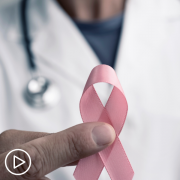How Can a Breast Cancer Psychologist Help You?
How Can a Breast Cancer Psychologist Help You? from Patient Empowerment Network on Vimeo.
Dr. Kathleen Ashton shares advices for patients facing a breast cancer diagnosis, including tips for emotional coping, talking to friends and family, as well as utilizing support services.
Dr. Kathleen Ashton is a psychologist in the Breast Center, Digestive Disease and Surgery Institute at Cleveland Clinic. Learn more about Dr. Ashton, here
See More From The Pro-Active Breast Cancer Patient Toolkit
Related Programs:

|
 Metastatic Breast Cancer: Accessing the Best Treatment for YOU |
Transcript:
Dr. Ashton:
My name is Dr. Kathleen Ashton. I am a breast psychologist at the Cleveland Clinic Breast Center.
So, I work with breast cancer patients in a number of different ways. I work with patients when they’re first diagnosed in terms of adjusting to their diagnosis and managing treatments. I work with long-term survivors of breast cancer who might be dealing with symptom management or the emotional after effects of their cancer. And then, I work with metastatic breast cancer patients as well.
Some of the common fear is that breast cancer patients experience are progression. They worry about how their disease is going to affect their family. They might worry about managing symptoms like fatigue and pain. And they also worry about their quality of life and maintaining the things that are most important to them.
When I work with patients who are worried about how metastatic breast cancer is going to affect their life, I often use two specific types of therapy.
One is called cognitive behavioral therapy which deals with the different thoughts that a patient might be having about their breast cancer as well as the different behaviors they might engage in that either help them or hurt them with their emotions. And then, the second type of therapy I often use is called acceptance and commitment therapy. And in particular, for metastatic breast cancer patients, this is a really helpful type of therapy that focuses on values, what gives people meaning in life, and whether their actions are in line with their values.
When metastatic breast cancer patients come to me for advice, one of the first things I usually tell them is that metastatic breast cancer is an emotional roller coaster.
There are ups and downs, there’s scans, there’s new types of treatment that they might be encountering and wondering about what the side effects are. So, what can be most helpful to those patients is really learning to stay in the present moment to, kind of, cope with things as they come and not look too far ahead, but also, be able to enjoy the moment that they’re going through.
When sharing their diagnosis with their family and friends, metastatic breast pit – breast cancer patients may experience just misunderstanding in what it means to have metastatic breast cancer. They may need to educate their family and friends that the goal of their treatment is often not a cure, but there are still treatments that can be helpful for them, and they can still maintain a good quality of life.
As a patient, if you’re interested in seeking a second opinion, it’s important to know that getting a second opinion is very normal with metastatic breast cancer. And your providers often are expecting this and would support that. So, just sharing with your provider your plan, the specific questions that you might have can help to facilitate communication between the two of you.
It’s important to know, as a breast cancer patient, that there are many resources to help deal with emotional issues. So, there are psychologists, psychiatrists, social workers who often have specific expertise in working with breast cancer patients. In addition, there are other resources such as cancer support communities, there are patient networks that help patients talk to each other.
There’s one called 4th Angel that we use a lot at the Cleveland Clinic that’s very helpful. And there’s alternative therapies as well, things like yoga, art therapy, music therapy that are all available to metastatic breast cancer patients.
When facing metastatic breast cancer, it’s important that patients know that they can lead meaningful lives, have close relationships, and have good quality of life. I also would add that, it’s important for them to know that mental health can be a part of their treatment team, that it’s common to have anxiety and depression, and just stress management concerns, and psychologists, psychiatrists, social workers all might be possibilities to add to their team to help them to have a good treatment outcome.










